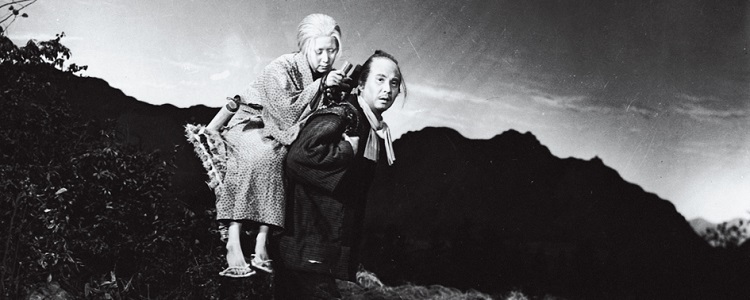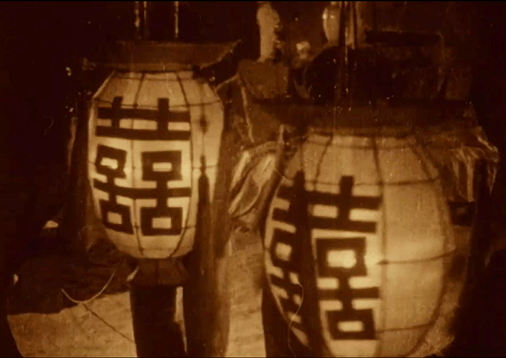大佛廻國 [Daibutsu kaikoku / The Great Buddha Arrival] (Yoshirō Edamasa, 1934)
Dec
22
.jpg)
Buddha takes a holiday. A gigantic Buddha statue rests his hand on a multi-story building in possibly Kyoto. In front and sprawling out are multiple small wooden establishments with people in kimono and several bicycles in front of them. A tram, the only thing that suggests the 20th century, can be seen almost off-screen. (via). DPs: Haruzo Ando & Harumi Machii.
Something tall*
In this very early kaiju moving picture, Buddha returns and goes on a sightseeing trip through Japan.
* the Bales 2025 Film Challenge for December has a few dateless themes. This is one of them.
Buddhism
“Can't you see that whatever you do is futile? The armies of Britain and Japan can come and fight all they wish. Burma is still Burma. Burma is the Buddha's country.”ビルマの竪琴 [Biruma no tategoto / The Burmese Harp] (Kon Ichikawa, 1956)
Apr
8
花祭り

Mizushima (Shōji Yasui) holding his harp, looked over by the reclining Buddha. DP: Minoru Yokoyama.
A film about Buddhism, or set in Japan, in honour of the birth of Buddha, celebrated in Japan on April 8 as 花祭り (Hana Matsuri, aka Flower Festival)
– old monk
While stationed in Burma, Mizushima disguises himself as a dhutanga, a wandering Buddhist monk, burying the remains of his fellow Japanese soldiers.
– Dont raise your voice! I'll kill you if you make a sound. – Would you please? 聖母観音大菩薩 [Seibo Kannon daibosatsu / Eros Eterna] (Kōji Wakamatsu, 1977)
Mar
7
immortality

The yao bikuni (Eiko Matsuda) rises from the ocean. DP: Hideo Itō.
An immortal character on the date Highlander (1986) was released.
When a woman eats the flesh of a 人魚 (ningyo, litt. “human fish” but in Western context commenly translated as “mermaid”), she may become a 八百比丘尼 [yao bikuni], an 800 year* old Buddhist nun granted youth and longevity.
*The number 8 symbolises growth and prosperity. Larger numbers starting with 8 indicate that the amount is endless, comparable to saying “hundreds/thousands/millions of […]” in English. Therefore, 800 years can be understood as immortal.
行者 [Jingang Jing / Walker] (Tsai Ming-liang, 2012)
Dec
8
बोधि

The monk (Kang-sheng Lee) walking Hong Kong. DP: Tsai Ming-liang.
“This winter… I'm going to the mountain. My mother went to the mountain, as did the mother-in-law of our home. So I have to go too.”楢山節考 [Narayama-bushi kō / The Ballad of Narayama] (Keisuke Kinoshita, 1958)
Dec
11
International Mountain Day

Tatsuhei (Teiji Takahashi) with his mother Orin (Kinuyo Tanaka) in a bamboo carrier on his back. She's combing his hair. Around them the mountain range. DP: Hiroshi Kusuda.
Travel mountains on International Mountain Day
A starving community has come to the agreement that the elders approaching the age of seventy are to be carried up Narayama mountain to die. The day prior to the mountain's festival, sixty-nine year old Orin prepares to leave, carried by her son Tatsuhei.
– Orin
In Keisuke Kinoshita's highly stylised 楢山節考, the arguably cruel (and most likely fictional) practice – of 姥捨て [ubasute, abandoning an old woman] – is superbly abstracted. Narration, dramatic lighting, colour filters and very obviously a soundstage underline that what we're watching is not a film, but a kabuki play.
“Today is our Queen's wedding day, let us drink it up!”盘丝洞 [Pan si dong / The Cave of the Silken Web] (Dan Duyu, 1927)
Jul
14
Pandemonium Day

Pandemonium happening, with Tang Sanzang as its object of desire (gif via. DP: Ganting Dan.
Dan Duyu's 盘丝洞 is, in its most literal sense, a fantastic silent interpretation of Wu Cheng'en's 西遊記 / Journey to the West. Monk Tang Sanzang (Meikang Jiang) finds himself trapped in a cave with seven beautiful sisters. Two of Tang Sanzang's faithful disciples, Sun Wukong (the Monkey King) and Zhu Bajie (Pigsy: half man, half pig), need to save him before one of the sisters takes the celibate monk as her husband. What follows is a vigorous display of #wuxia, horror, monkey shenanigans, and – during the pandemonium unfolding in the final act – a small glimpse into the vast pantheon of China's gods and demons.
Note that some of the reels are still missing, and the English translation I found is subjective at best, so have a translation app at the ready. Nevertheless, take a moment to dim the lights, and accompany Tang Sanzang, the Monkey King, and Pigsy on their pilgrimage. Even if only for a little while.